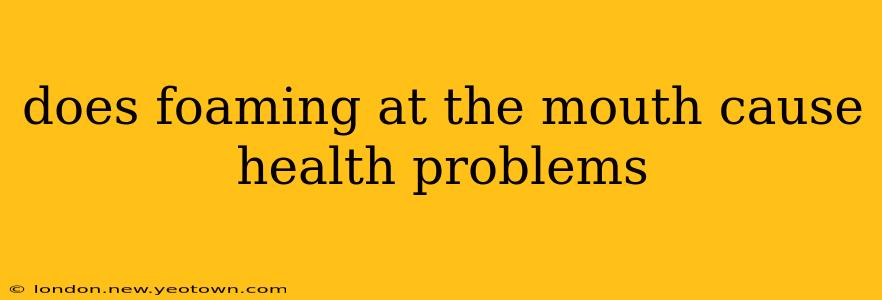Does Foaming at the Mouth Cause Health Problems? A Deep Dive into Frothy Symptoms
Foaming at the mouth, also known as salivary hypersecretion or ptyalism, isn't a disease itself, but rather a symptom that can signal a range of underlying health issues. Imagine this: you're enjoying a relaxing evening, when suddenly, you notice someone nearby exhibiting this unusual symptom. It's naturally alarming, prompting immediate concern for their well-being. This article explores the potential causes, associated risks, and when to seek immediate medical attention.
What Causes Foaming at the Mouth?
The appearance of foam at the mouth is essentially excess saliva mixed with air. Several factors can contribute to this:
-
Rabies: This is perhaps the most well-known, albeit thankfully rare, cause of foaming at the mouth. The virus attacks the nervous system, leading to excessive salivation, along with other neurological symptoms like aggression, paralysis, and hydrophobia (fear of water).
-
Epileptic Seizures: During a seizure, loss of muscle control can lead to excessive saliva production and frothing. The foaming may be accompanied by other seizure symptoms, such as convulsions, loss of consciousness, and post-ictal confusion.
-
Poisoning: Certain toxins, including pesticides, insecticides, and some types of plant toxins, can trigger excessive salivation as a part of the body's toxic reaction.
-
Metabolic Disorders: Conditions like hepatic encephalopathy (liver failure) and kidney failure can cause neurological changes that lead to excess salivation.
-
Gastrointestinal Issues: Some gastrointestinal problems, such as severe nausea or vomiting, can trigger increased saliva production.
-
Medication Side Effects: Certain medications, particularly some antipsychotics and some drugs used to treat Parkinson's disease, can list excessive salivation as a possible side effect.
-
Anxiety and Stress: In extreme cases of anxiety or panic attacks, the body can overproduce saliva.
-
Mouth Injuries: Traumatic injuries to the mouth can irritate the salivary glands and increase saliva production. This is often localized to the injured area.
Can Foaming at the Mouth Be Dangerous?
The danger associated with foaming at the mouth directly correlates to the underlying cause. While mild anxiety might cause temporary foaming, rabies can be fatal without immediate treatment. Therefore, the symptom itself isn't inherently dangerous, but the condition causing it might be.
What Should I Do If I See Someone Foaming at the Mouth?
This depends heavily on the context. If the person is experiencing other symptoms like convulsions, loss of consciousness, or aggression, it's crucial to immediately call emergency medical services. Do not attempt to restrain the individual; instead, ensure their safety by clearing the area of potential hazards.
How Is Foaming at the Mouth Diagnosed?
Diagnosing the underlying cause requires a thorough medical evaluation. This will typically involve a physical exam, taking a detailed medical history, and potentially running blood tests, imaging studies (like an MRI or CT scan), or other specialized tests depending on the suspected cause.
Is There a Treatment for Foaming at the Mouth?
Treatment focuses on addressing the underlying cause. If it's a medication side effect, the doctor might adjust the dosage or prescribe an alternative. For seizures, anticonvulsant medications might be necessary. Rabies requires immediate post-exposure prophylaxis. In cases of poisoning, treatment involves removing the toxin and managing the symptoms.
How Can I Prevent Foaming at the Mouth?
Preventing foaming at the mouth primarily involves preventing the underlying conditions. Maintaining good oral hygiene, managing stress effectively, and following your doctor's advice on medications can help minimize the risk.
This information is for general knowledge and does not constitute medical advice. If you or someone you know is experiencing foaming at the mouth, especially if accompanied by other symptoms, seek immediate medical attention. Early diagnosis and treatment are vital for many of the potential underlying conditions.

